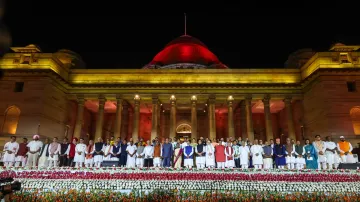Modi 3.0: The Bharatiya Janata Party (BJP)-led National Democratic Alliance (NDA) government has taken charge at the Centre after the alliance secured 293 seats, more than the majority mark, in the recently concluded Lok Sabha elections. Narendra Modi has become Prime Minister of India for the third consecutive time. The grand oath-taking ceremony of the Prime Minister and his Council of Ministers was held on Sunday evening, June 9. Narendra Modi and 71 BJP-NDA leaders took the oath of office during the event.
On Monday, a day after the oath-taking, the government allotted portfolios to the newly inducted ministers. The core ministries including Home, Defence, Finance, Road, Railways and External Affairs have been allotted to the same ministers as in Modi's second term. Amit Shah, Rajnath Singh, Nirmala Sitharaman, S Jaishankar, Nitin Gadkari, Shivraj Singh Chouhan and others have been distributed key portfolios including Home, Defence, Finance, External Affairs, Road transport, and Agriculture, respectively.
Who will be the Lok Sabha Speaker in Modi 3.0?
The BJP emerged as the single largest party in the Lok Sabha elections in 2024, but it fell short of achieving the magic figure of 272 on its own. Since the party managed to win 240 seats, it formed the government with the support of allies including Chandrababu Naidu's Telugu Desam Party (TDP), Nitish Kumar's Janata Dal-United (JDU), Chirag Paswan's Lok Janshakti Party-Ram Vilas (LJP-RV), Eknath Shinde's Shiv Sena among others. Though most of the government portfolios to the newly inducted ministers of BJP-NDA have been allotted, the post of Speaker in the Modi 3.0 government is yet to be announced. Will the Speaker be from the BJP once again or from the saffron party's allies? Let's analyse.
The 17th Lok Sabha, in which the BJP was in an absolute majority with 303 seats, elected Om Birla as the Speaker. In a first, no Deputy Speaker was elected through its term of five years. As per Article 93 of the Constitution, the Lok Sabha shall, as soon as may be, choose two members to be Speaker and Deputy Speaker so often as the offices become vacant. However, it does not provide a specific time frame.
What happened in previous BJP-led coalition governments under Atal Bihari Vajpayee?
In the 12th Lok Sabha, led by former Prime Minister Atal Bihari Vajpayee - which lasted for 13 months, from March 10, 1998 to April 26, 1999 - Telugu Desam Party (TDP) leader GMC Balayogi was elected the Speaker in March 1998. He held the post until 2002.
In 2002, during the full 5-year term (1999-2004) of the BJP-led NDA government, Shiv Sena's Manohar Joshi was elected Lok Sabha Speaker after the death of Balayogi in 2002.
In 2014 under the leadership of Narendra Modi, the BJP alone won a total of 282 seats, more than the magic figure while together with the NDA, its total strength in the Lok Sabha was 336.
In 2019, the saffron party maxed out its performance and won 303 seats on its own while together with the NDA, the alliance stood at 353 seats in Lok Sabha.
During Vajpayee's era, the BJP couldn't cross the 200 mark on its own, therefore, the stability of the government was largely dependent on its allies, and the Speaker post was allotted to alliance partners.
The BJP secured the majority on its own in 2014 and 2019 under PM Modi, though it accommodated alliance partners as well in the government but the Speaker post was held by the saffron party.
Now talking about 2024, the BJP is the single largest party with 240 seats, close to the magic figure but still 32 seats short. The situation still gives room to the BJP to bargain for the Speaker post but if it's unable to do then the post is likely to be given to Chandrababu Naidu's Telugu Desam Party or Nitish Kumar's Janata Dal-United, so the suspense continues.
Latest India News
